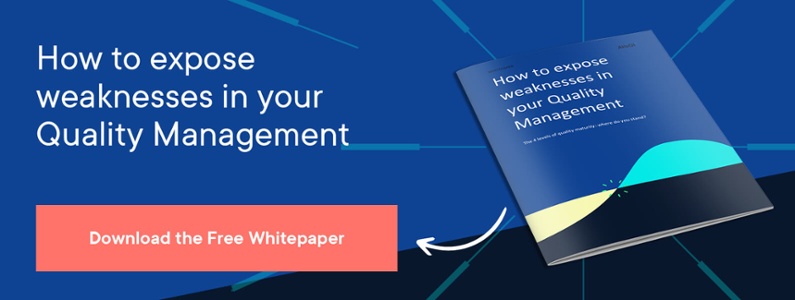Businesses across the world are being tested in terms of quality. Companies that were already struggling with quality have entirely broken down during the pandemic. This has happened especially in medical companies and related corporations directly involved in the COVID-19 crisis.
Due to these breakdowns, medical companies have learned three critical lessons from the pandemic. However, not all of them are cautionary tales. We’ll give you notable cases that provide hope for agility, success, and resilience in the face of adversity.
In the end, you will know that the last thing to do in tough times is to sacrifice quality, even during a pandemic. Even though the examples given are from the medical field, you can still apply them to your business, whether medical or not.
Let’s get into it.
Lesson #1: Issues with supplier quality increased during emergency situations
Supplier quality is always an essential factor. But when manufacturers rush to develop life-saving products in times of a crisis that causes mass-scale supply chain disruptions, supplier quality becomes highly relevant.
Two issues that have a significant impact on the supplier quality during the current COVID-19 pandemic are scale and speed. EpiGuard, the Norwegian company that manufactured Epishuttle to transport highly infectious patients, learned firsthand how supplier issues intensify when a crisis hits.
They experienced a high demand for their products when the coronavirus began. Due to EpiShuttle’s nature, the company was mandated to speed up the protective Class I medical device production. They had to deliver regardless of their factory closures and social distancing instructions. Not forgetting the challenges of working from home that their suppliers were experiencing. According to Zaid Hamed, the EpiGaurd CTO, they had to work day and night to manufacture the product.
When you need to qualify new suppliers, it becomes a problem when you have to brief them quickly. And that’s because remote working has become the standard of the day. When there is a robust qualification process assisted by relevant digital tools, it can help companies such as EpiGaurd. Quality Management System Software can also be beneficial in standard operating procedures.
Furthermore, with cloud-based solutions, you have the ability to collaborate with your suppliers remotely effectively. Through that, you can work with your suppliers on future quality issues and specifications with highly needed products.
Lesson #2: Quality must extend across your company's entire ecosystem
As you plan to outsource partners or find alternate ways to expand your business unit sites, quality should remain a priority during the pandemic. And it must be pervasive. Companies that depend on paper-based systems simply cannot have accurate and real-time quality data and related activities throughout the company ecosystems.
Due to that, there is no precise way you can maintain the quality during a crisis. That’s why it’s ideal to have a Quality Management System Software that’s cloud based. With cloud based QMS software, you can sustain quality alignment throughout your entire remote and systems sites. When you do that, you maintain a uniform quality that extends to your entire ecosystem as and when it shifts.
A good example is EpiGuard. The company’s consistent distributors haven’t been able to deliver due to the coronavirus pandemic. So they had to look towards their other distributors in England, Germany, and France.
Worldwide quality alignment during the coronavirus has shown to be equally as relevant in the vital field of laboratory testing. Nelson Labs is a global supplier of analytical and microbiological lab testing. The company has been involved in testing the effectiveness of respirators and face masks during the pandemic crisis.
Keeping pace with broadening ecosystem changes, even during a pandemic, can only be done with quality management tools. And the QMS must be able to meet your quality management qualifications, especially if it can extend effectively across your company’s entire ecosystem.
There are eight critical questions you need to ask to determine if the QMS can ensure consistency throughout the ecosystem:
- Does the configurability level of the QMS meet your business requirements?
- Does it have the integration and modularity features that your business needs?
- Does it incorporate analysis based on risk?
- How fast can new features, patches, enhancements, and upgrades be integrated, especially in situations like the pandemic?
- How difficult is the systems’ validation?
- Can you customize the systems’ intelligence to meet your users’ tasks?
- Is it favorable and capable of adapting to the specifications of regulatory innovations and emerging technologies?
- Is it equipped to facilitate the future extension of your business?
Lesson #3: Flexible systems, quality processes, and teams are vital in a crisis
The pace at which a company can fill in the gaps when a crisis occurs determines how quickly they react and stay ahead of competitors. And it’s not only a crisis but also when new opportunities or shortages arise.
Fagron is a worldwide leader in personalized medicine and pharmaceutical compounding. They have demonstrated the importance of versatility as they’ve been able to increase their standard steroid dexamethasone processing. It was recently proven to be efficient in battling the coronavirus in patients that are seriously ill.
The company is popularly known to be the supplier of dexamethasone, and compounding pharmacies requested their services when they ran out of drugs. However, since there was a high demand for dexamethasone, it increased the pressure on Fagron to produce more of the product.
But due to their flexible processes, they were able to meet the increasing demand.
According to Mathew Seitz-Paquette, Fagron’s quality specialist in North America, Dexamethasone is something they can quickly supply to various compounders worldwide. However, big companies in traditional pharmaceuticals may have a problem with delivery.
When a crisis happens and forces organizations to look for other alternatives, companies that maintain flexible quality systems and processes will thrive.
Conclusion
There are numerous steps you can take to adapt to new obstacles and environments which will eventually occur. When you take such measures, such as the points outlined in this article, you can confidently battle against all sorts of quality issues.
But whatever happens, remember that tough times will occur. And when they do, compromising with quality should be the last thing to do. Make it an objective to provide high-quality standards for your partners continually.
How mature is your quality management?
In this era of smart manufacturing, quality will become smart as well. This transition will not happen overnight and this will not happen in a linear way. Our Quality Intelligence Maturity Model presents a springboard to change and asks organizations to self-assess to what extent they are ready for Quality Intelligence and to leverage tomorrow’s possibilities.
The Quality Maturity Model is designed to highlight the strengths and expose potential weaknesses of all aspects of your Quality Management, giving you the input necessary to strategize for positive change.



